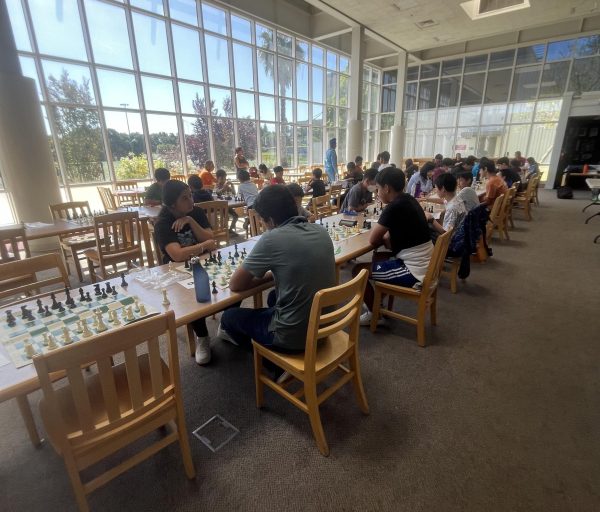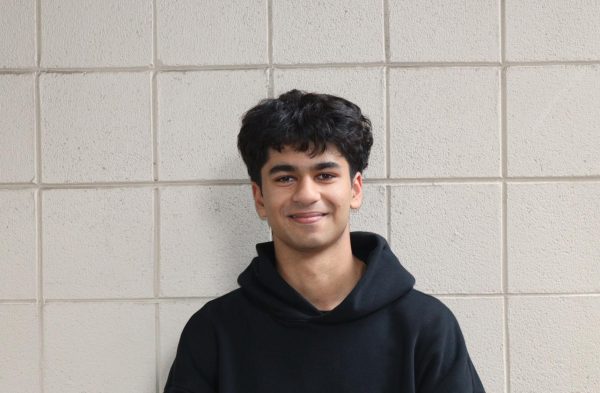Sophomore Neha Sharan remembers being in elementary school in Texas and scanning the room at a chess competition in Dallas. She counted just five girls out of the 50 players bustling around chess boards at a competition.
After she was introduced to the game in kindergarten while attending a summer camp at the University of Texas at Dallas, Sharan fell in love with the game and played throughout elementary and middle school. But since so few girls played, she never found the sense of community she desired.
In 2024, determined to address the lack of female participation in chess, she founded Girls4chess, an organization with the goal of bringing more girls into chess.
Sharan first fell in love with chess at a young age
While she herself just played with her family to start, the hobby quickly grew into a passion to compete. She attended her first tournament in first grade.
Chess tournaments were common events in Dallas. Sharan could often drive to one just 10-20 minutes away from her house, leading to her often competing weekly.
In elementary school, Sharan found a coach who was also part of a chess program that she was attending, UT Dallas Chess. With her coach, she would analyze games and solve positional problems, later practicing on her own as well. By the latter half of elementary school, she found herself playing chess tournaments nearly every Friday, Saturday and Sunday.
As she continued to compete regularly, she soon climbed the ranks from a novice to an advanced player, at which point she found that she struggled with raising her rating. Chess ratings utilize an Elo system to represent a player’s skill level based on performances with different players. Typically, players start with ratings around 100 and gain or lose Elo based on wins and losses.
“Hitting certain ratings is challenging,” Sharan said. “There’s a lot of preparation and studying that goes into chess, so getting past certain ratings requires more effort, more experience and more challenges over time.”
As her rating rose, Sharan noticed how rare it was to see a girl while competing. The lack of community and representation made her feel as if she was out of place.
Instead of weekly amateur tournaments, she started attending professional tournaments in seventh grade, which were hosted every couple of weeks and designed for more advanced players. During the pandemic, she continued to participate in online tournaments.
Sharan went on to compete in tournaments such as the North American Junior Championships and the All-girls National Championship hosted in Chicago, competing in the U10 division. Sharan peaked at 1,580 Elo in the United States Chess Federation (USCF) in 2022.
But once eighth grade began, Sharan struggled to find enough time to practice chess along with her schoolwork and other extracurriculars. Her family moved to Saratoga prior to high school, determined to keep pursuing her hobby. But she found tournaments harder to participate in here. For one thing, the entry fee is $50 higher than in Texas. On top of this, Sharan became busy with school work and other extracurriculars, leading her to stop competing.
Even so, Sharan’s passion for chess has remained strong and she became vice president of the school’s chess club and began helping host tournaments.

A chess tournament hosted at Saratoga High School by the Saratoga Chess Club.
In her first tournament, 36 students attended. After hosting it for the club, Sharan moved on to building her own organization. She became a USCF registered tournament director and began to conduct tournaments by herself.
At these tournaments, even in the middle of Silicon Valley, Sharan noticed a lack of girls participating.
As of February 2022, Quantitative Economics found that just 11% of mixed-sex tournament players and 2% of Grandmasters are women. Of the US Chess Foundation’s top 100 overall players, Alice Lee and Carissa Yip are the only two females.
At one point, she attended a tournament at Menlo High and noticed a student-led nonprofit called NorCal High School Chess Association. The organization conducted tournaments every two months, and Sharan was interested in doing something similar.
“I thought that it was cool, but I wanted to center it for girls since lots of girls don’t play chess; I wanted to go and change that,” Sharan said.
With Girls4chess, Sharan began to host tournaments at the India Community Center in Milpitas, charging a $5-10 entry fee. This past January, the non-profit began hosting co-ed tournaments, taking in 15-20 attendees. Since then, the foundation has raised around $600, which contributes to buying trophies, chess boards, clocks and tournament software. While the tournaments are co-ed, Sharan hopes to have all-girl tournaments in the future, like the All-Girls National Championships she attended in Chicago. She wants to center Girls4Chess around girls since she feels a lot of them don’t play chess.
She opened the foundation on her own last year, then began slowly recruiting people she knew through chess. Now, the non-profit has an eight-member board, consisting of high school and middle school students from various schools across Texas, California and Nevada. Sharan also receives help from some adults she met in the chess community, guiding her on how to direct tournaments.
Through Girls4chess, Sharan also occasionally teaches online chess classes for 10-15 younger students, sharing her expertise for free. She believes that she’s made a huge impact on students who have improved considerably.
In the future, Sharan hopes to expand on her goal of bringing as many girls into chess as possible.
“I think less girls participate because playing chess is looked down upon,” Sharan said. “A lot of people just assume it’s for guys or they assume it’s a weird hobby. I understand where they come from, but I think the stereotype scares everyone away.”

























